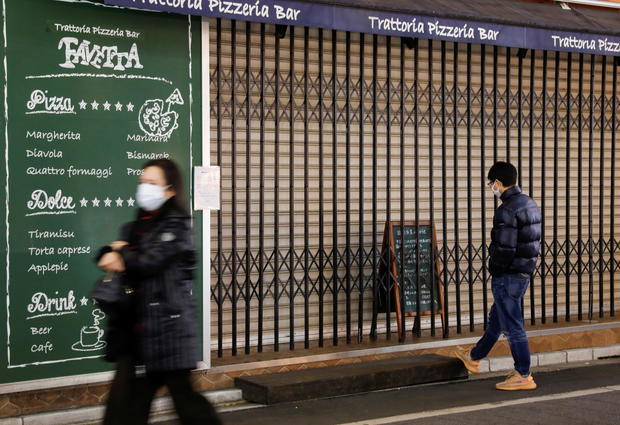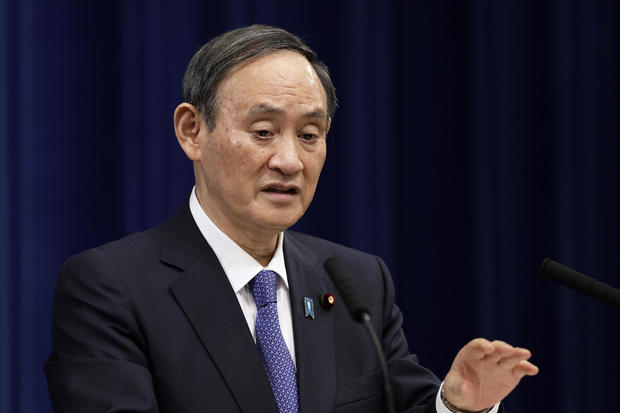Tokyo — As Tokyo and the surrounding area chart frightening new levels of COVID-19 infection, Japanese Prime Minister Yoshihide Suga has declared a state of emergency in the region for the second time since the pandemic began. The latest viral surge — with nearly 1,000 new cases in Tokyo on Thursday — is being fueled by winter temperatures driving people to gather indoors, and compounded by government efforts to restart economic activity with a now-halted domestic tourism promotion campaign.
The latest state of emergency (SOE) declaration is highly targeted, covering only Tokyo and the three prefectures surrounding it, which account for half of Japan's coronavirus cases. Urbanized western and central Japan may later be added to the order.
The new rules
The SOE restrictions this time around are primarily aimed at the dining industry.
"Eating and chatting is the most high-risk" activity, Dr. Koji Wada, a public health expert who's advising the government on its coronavirus response, told CBS News. Bars and restaurants will be asked to close by 8 p.m. for the duration of the SOE, which is currently set to last until February 7.
Eateries will be entitled to subsidies of up to about $600. Noncompliant businesses can be publicly named and shamed.
Residents in the affected areas will be asked to avoid all nonessential outings and to work from home if possible.
Schools are exempt from the SOE this time, and internet cafes, sports gyms and even karaoke studios — which in recent months have managed to stay relatively COVID-free, apparently thanks to ventilation, hygiene upgrades and greater conscientiousness among customers —— will be allowed to stay open, albeit with shorter hours. Digital carbon dioxide sensors, which can gauge how well rooms are ventilated, are selling briskly.
There's broad support for the restrictions in Japan. Separate online polls carried out on January 6 by the Japan Trend Research company and Yahoo Japan found that between 72% and 80% of respondents were in favor of the latest SOE, with less than 10% opposed.
Japan's sense of crisis may seem hard to fathom in the U.S., where the impact of the pandemic is of a different order of magnitude — so far Japan has sustained only about 1% as many infections and deaths as the U.S. But the spike in cases is already overwhelming Japan's health care infrastructure.
"Medical system collapse is already happening in some areas," Dr. Wada said. "Other patients — ischemic [stroke] and cancer cases — are having trouble finding treatment."
Too little too late?
Incredibly, Japan, a country with one-third the U.S. population, has about the same number of hospital beds. Yet authorities, lulled into complacency by Japan's success at tackling infections last year, failed to adequately prepare for the winter surge of patients, according to the Nikkei business newspaper.
Tokyo has announced it is adding 500 more hospital beds specifically to treat COVID-19 patients, and the city will rent an additional hotel to house mild and asymptomatic cases.
Prime Minister Suga's popularity has withered under accusations that he acted too late to address the current spread of infections.
"Now the government is starting to use the hammer" said Dr. Wada, "but we don't know if it will solve this surge."
Hiroshi Nishiura, an expert in computer modeling on infectious diseases, released a projection showing that, unless Japan adopts the wider-ranging restrictions used to sharply reduce human contacts last spring — and unless that shutdown stays in place for two months — cases will flatten but remain at high levels, exceeding 1,000 a day.
Olympic dreams
Coming just six months before the planned start of the delayed Tokyo Olympics, the new SOE has sown further doubts over whether the Games can be held at all without sparking yet another surge of infections.
There are also concerns over whether a level international playing field is possible, given the wide gap in when different countries are expected to receive vaccines.
World - Latest - Google News
January 07, 2021 at 09:08PM
https://ift.tt/3bg2err
Why Tokyo ended up with a new COVID-19 emergency, and how it's fighting it - CBS News
World - Latest - Google News
https://ift.tt/2SeTG7d
Bagikan Berita Ini
















0 Response to "Why Tokyo ended up with a new COVID-19 emergency, and how it's fighting it - CBS News"
Post a Comment